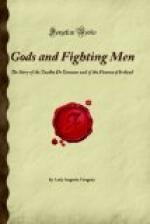Sleep came on him then after eating the broth, and the Fomor were laughing at him, for his belly was the size of the cauldron of a great house. But he rose up after a while, and, heavy as he was, he made his way home; and indeed his dress was no way sightly, a cape to the hollow of the elbows, and a brown coat, long in the breast and short behind, and on his feet brogues of horse hide, with the hair outside, and in his hand a wheeled fork it would take eight men to carry, so that the track he left after him was deep enough for the boundary ditch of a province. And on his way he saw the Battle-Crow, the Morrigu, washing herself in the river Unius of Connacht, and one of her two feet at Ullad Echne, to the south of the water, and the other at Loscuinn, to the north of the water, and her hair hanging in nine loosened locks. And she said to the Dagda, that she would bring the heart’s blood of Indech, son of De Domnann, that had threatened him, to the men of Ireland.
And while he was away Lugh had called together the Druids, and smiths, and physicians, and law-makers, and chariot-drivers of Ireland, to make plans for the battle.
And he asked the great magician Mathgen what could he do to help them. “It is what I can do,” said Mathgen, “through my power I can throw down all the mountains of Ireland on the Fomor, until their tops will be rolling on the ground. And the twelve chief mountains of Ireland will bring you their help,” he said, “and will fight for you: Slieve Leag and Denda Ulad, and Bennai Boirche and Bri Ruri, and Slieve Bladma and Slieve Snechtae, and Slieve Mis and Blai-Slieve, and Nemthann and Slieve Macca Belgodon, and Segois and Cruachan Aigle.”
Then he asked the cup-bearers what help they could give. “We will put a strong thirst on the Fomor,” they said, “and then we will bring the twelve chief lochs of Ireland before them, and however great their thirst may be, they will find no water in them: Derc-Loch, Loch Luimnech, Loch Orbsen, Loch Righ, Loch Mescdhae, Loch Cuan, Loch Laeig, Loch Echach, Loch Febail, Loch Decket, Loch Riach, Mor-Loch. And we will go,” they said, “to the twelve chief rivers of Ireland: the Buas, the Boinn, the Banna, the Nem, the Laoi, the Sionnan, the Muaid, the Sligech, the Samair, the Fionn, the Ruirtech, the Siuir; and they will all be hidden away from the Fomor the way they will not find a drop in them. But as for the men of Ireland,” they said, “there will be drink for them if they were to be in the battle to the end of seven years.”
And Figol, son of Mamos, the Druid, was asked then what he would do, and he said: “It is what I will do, I will cause three showers of fire to pour on the faces of the army of the Fomor, and I will take from them two-thirds of their bravery and their strength, and I will put sickness on their bodies, and on the bodies of their horses. But as to the men of Ireland,” he said, “every breath they breathe will be an increase of strength and of bravery to them; and if they are seven years in the battle they will never be any way tired.”




